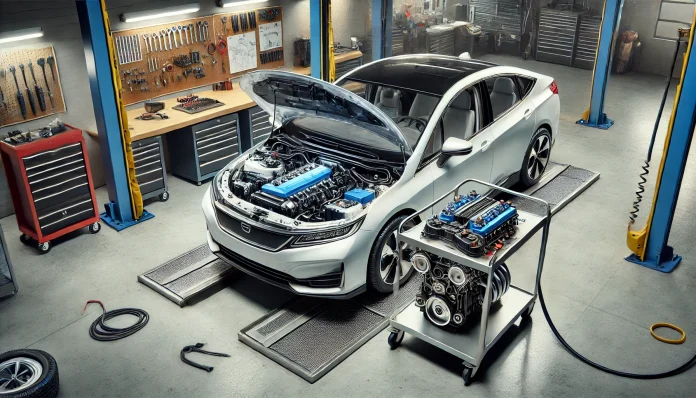As fuel prices soar and environmental concerns grow louder, a quiet revolution is gaining momentum on the streets of Africa. From bustling Lagos to the scenic highways of Nairobi, car owners are swapping roaring engines for the silent hum of electric motors. The conversion of internal combustion engine (ICE) vehicles to electric vehicles (EVs) is no longer a distant idea — it’s becoming a practical solution for the average African motorist.
At the heart of this transformation is a growing realization: the future of mobility must be sustainable, affordable, and accessible. Converting an existing ICE vehicle into an EV checks all these boxes, offering a glimpse of hope for cleaner cities, lower transportation costs, and reduced dependence on imported fuel.
From Fuel to Electric: How It Works
The process of converting an ICE car to an EV may sound complex, but for many mechanics and tinkerers across Africa, it’s a challenge worth tackling.
One such enthusiast is Joseph Mwangi, a mechanic in Nairobi who has converted over a dozen cars for his clients.
> “When I started, it was out of curiosity,” he said. “Now, it’s my livelihood. People come to me because they’re tired of spending on fuel or worried about the environment. I help them keep their car but make it electric.”
The process involves removing the vehicle’s internal combustion engine, fuel tank, and exhaust system. In their place, an electric motor and a battery pack are installed, along with a controller to manage power distribution. Other auxiliary systems, like charging ports and cooling systems, are added to ensure the vehicle operates efficiently.
Mwangi notes that while the process can take several weeks, the result is often worth the wait.
> “Imagine driving a car that doesn’t vibrate, doesn’t make noise, and doesn’t choke the air with smoke. That’s what I deliver.”
Why Convert? The Advantages Are Clear
For car owners like Mary Adebola in Lagos, converting her 2012 sedan into an EV was a decision based on cost savings.
> “Fuel was eating up my income,” she said. “Now, I just plug my car into a solar charger at home. I don’t even worry about queues at petrol stations anymore.”
The advantages of converting ICE cars to EVs include:
1. Cost Savings: EVs are cheaper to run than petrol or diesel vehicles. Electricity costs less than fuel, and EVs have fewer moving parts, meaning lower maintenance expenses.
2. Environmental Impact: Converting an old car into an EV keeps it out of landfills and reduces greenhouse gas emissions.
3. Energy Independence: In a continent where fuel imports dominate, EVs can be charged using renewable energy sources like solar power.
4. Longevity: A conversion breathes new life into an older vehicle, extending its usefulness and avoiding the need to buy a new car.
5. Quiet and Smooth Driving: Without an engine, EVs offer a near-silent, vibration-free ride.
A Growing Movement Across Africa
While the idea of EVs was once associated with luxury Teslas and high-income countries, African entrepreneurs and innovators are making it locally relevant.
In Kenya, companies like ARC Ride are pioneering EV conversion kits designed for African roads. Similarly, in South Africa, GreenTech EV Solutions has started offering tailored services to individuals and fleets. Even in Nigeria, where power supply challenges persist, interest in EV conversions is growing rapidly.
> “Africans are resourceful,” said Dr. Kehinde Afolayan, an energy consultant in Lagos. “We’re finding ways to adapt technology to our reality. From using solar energy to charge EVs to training local mechanics, the possibilities are endless.”
Challenges Remain
Despite the optimism, the road to widespread adoption of EV conversions is not without obstacles:
High Conversion Costs: Converting a car can cost between $5,000 and $20,000, which is out of reach for many. However, businesses and governments are exploring subsidies and financing options to lower this barrier.
Charging Infrastructure: Public charging stations are sparse across the continent, making home-based charging setups essential for early adopters.
Skill Gap: EV conversions require specialized expertise, and there are currently limited training programs in Africa.
A Vision of Hope
For Mary and others like her, these challenges are not deterrents but stepping stones to a brighter future. She envisions a time when more of her neighbors will join the movement, converting their cars and contributing to cleaner air in Lagos.
> “When people see my car, they ask, ‘Is this really electric?’” she laughs. “I tell them, ‘Yes, and you can do it too.’”
The Road Ahead
Africa’s journey toward sustainable mobility is just beginning, but the enthusiasm and ingenuity of its people are paving the way. As governments introduce policies to support green transportation and businesses invest in making EV technology more accessible, the dream of clean, affordable mobility is becoming a reality.
For now, converting ICE cars to EVs offers a practical and inspiring way for Africans to take control of their transportation future — one car at a time.




